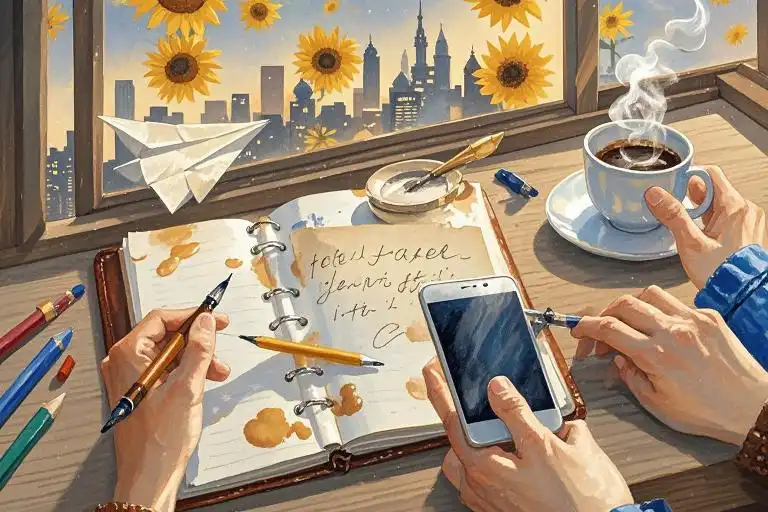The cursor blinked like a judgmental metronome, mocking my third attempt to describe the indescribable. Across the café table, my writing partner suddenly pushed her laptop away. “Why does this matter?” she asked, gesturing at our half-empty lattes and the crumpled draft pages between us. “When everyone’s shouting online, who even hears our whispers?”
We’ve all faced that moment – you, me, the barista who writes song lyrics on napkins during her breaks. In this age of 284,000 tweets per minute and AI-generated blogs, our human urge to create permanent words feels almost…quaint. Yet here we are, moths drawn to the flickering light of expression, compulsively turning life’s chaos into sentences.
The Secret Language of Human Experience
Remember pressing your ear against a seashell as a child? That hollow roar wasn’t really the ocean – it was the amplified sound of blood rushing through your own head. Writing works similarly. When we articulate our truth, others hear their truth echoing back.
Neuroscience confirms this magic. Dr. Uri Hasson’s fMRI studies at Princeton reveal that good storytelling synchronizes listeners’ brain patterns with the storyteller’s. Your description of grandma’s apple pie? It activates readers’ olfactory cortex. Your account of heartbreak? Their anterior insula lights up like yours did. We’re literally rewriting each other’s neural pathways through shared narratives.
Last month, my Ukrainian neighbor handed me a battered journal containing her grandmother’s recipes. Between instructions for borscht and pampushky, handwritten notes documented air raids in 1941 and the taste of stolen strawberries in 1944. Those smudged pages accomplished what newsreels never could – they made history breathe down my neck.
Writing as Time Travel
My students often groan when I assign “mundane object essays.” Then comes the revelation: A boy discovers his father’s wartime trauma through the story behind a chipped coffee mug. A woman reconstructs her immigrant mother’s journey using a 1970s metro card found in a coat pocket.
These aren’t mere exercises in nostalgia. Anthropologists call this “embodied cognition” – handling physical artifacts activates different memory pathways than digital photos. When we write about objects, we preserve sensory details that outlive our faulty recollections:
- The citrus-sharp smell of a hospital waiting room
- The sticky texture of July asphalt through worn sneaker soles
- The metallic tang of fear before a first kiss
Historian David McCullough argues that “real writing happens when you describe what you wished you’d noticed.” That’s why I keep a “sense journal” – not for grand events, but for the way steam curls from morning tea, or how winter light slants differently through my west-facing windows at 3:17 PM.
The Ripple Effect You Never See
Sarah, a librarian in Ohio, once scribbled a quote from Rilke on a bookmark and forgot it in a returned novel. Months later, a teen tracked her down to explain how those words stopped her from jumping off a bridge. “Your handwriting looked kind,” she said. “Like someone cared.”
We rarely witness our words’ full impact. Maya Angelou’s childhood mute years inspired her signature listening intensity. J.K. Rowling’s food stamp budgeting shaped Harry’s cupboard-under-the-stairs realism. Your unspoken struggles? They’re fertilizer for stories that help others grow.
Try this: Next time self-doubt creeps in, write your message on biodegradable paper and…
1) Leave it in a library book
2) Tape it to a park bench
3) Fold it into a paper boat
You’ll never know whose hands it reaches – and that’s the beautiful part.
Your Words Matter More Than Algorithms
Yes, AI can generate 10,000 “meaningful” essays before you finish reading this. But only humans write sentences that:
- Make coffee taste bitterer after bad news
- Turn a stranger’s nervous laughter into a love language
- Transform hospital beeps into a morse code of hope
That notebook you abandoned last week? It contains someone’s future lifeline. Those half-formed ideas in your Notes app? They’re seeds for cultural antibodies against despair.
As Toni Morrison famously said, “If there’s a book you want to read that hasn’t been written yet, you must be the one to write it.” So let’s make a pact: When the cursor blinks judgmentally today, type one true sentence. Then another. Keep going, kid.

